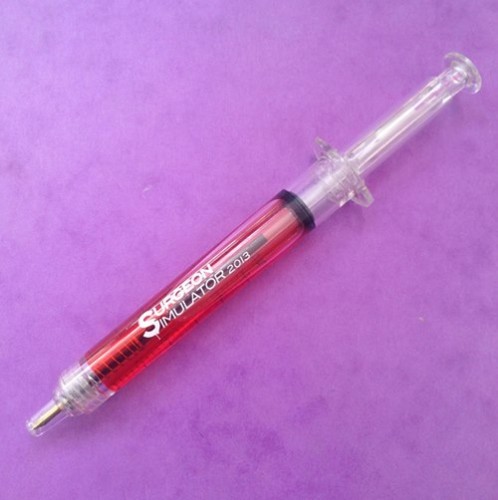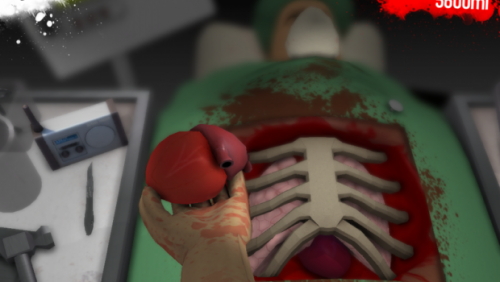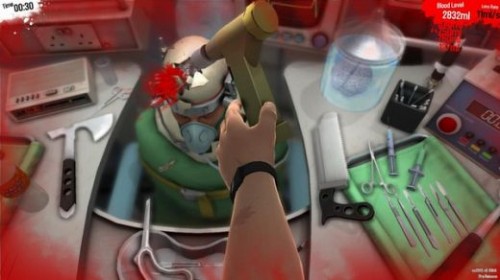Meet The Surgeons – We Share A Few Words With Bossa Studios, Creators of Surgeon Simulator 2013
At this years Rezzed, Chris and I were lucky enough to grab a few minutes with James Broadley and Luke Williams, a couple of the minds responsible for the absurd and delightful Surgeon Simulator 2013. Momentarily taking a break from saving lives, they were happy enough to answer a few questions from us.
So Surgeon Simulator 2013 originally spawned as part of the 2013 Global Game Jam. Whose idea was it to take the heart theme of the jam so literally?
James Broadley: I don’t know to be honest. I’ve been asked this question a couple of times, and I don’t know who originally said it…it was Bossa’s idea as a combination, I suppose.
Luke Williams: Yeah, it wasn’t just that someone said “We should totally do a heart transplant where you have a crappy surgeon hand controlled by each key.” It was more like… “I can imagine a crap hand,” and that eventually led to “Alright, let’s literally do a heart transplant…” We thought more about the control scheme afterwards, because we were thinking something like QWOP and just making it really hard and frustrating to play!
James Broadley: Plus, with the controls as well – that came from the jam. There was a list of different requirements, and if you could get them in your game, you’d get an extra point or something. One of those was to use ten keys on the keyboard. Obviously ten keys initially was a bit difficult to do, having to hold all the keys with one hand…
Luke Williams: Yeah, it was at least ten keys, and we thought “well, if we’re using hands, then it’s a key per finger. Boom!” Then I realised you can’t move the hand around, so that doesn’t actually work – so we kept it a key for each finger on just the left hand… kind of to match your left hand on the keyboard and using the mouse to move it around.
I did wonder if one of you was left handed?
Luke Williams: No, it’s purely from the point of view that if you’re right handed, you’ll have your right hand on your mouse. We thought we’d match it. It looks like a left-handed game, but it actually isn’t when you sit down and have your hand in that position.
James Broadley: We did think about having it the other way around, having the right hand control the right hand. It makes sense as well visually, because that’s doing the same thing that you see on screen.
So the recent Team Fortress 2 addition shows you’re not afraid to tinker. Are there any more expansion plans moving forward? Are you going to be carrying on with adding content or are you done with Surgeon Sim?
Luke Williams: I don’t know, to be honest. We haven’t really had a chance to find out yet. We only released the update on Friday, and we haven’t even had the chance to see what the real reception to the TF2 stuff has been… we think the reaction was good?
James Broadley: Yeah, it’d be nice to add more content and do more things with it, but it’s too early for us to think about.
Luke Williams: We really wanted to keep the development very much like the game jam version, so we could mostly not lose what would was successful about that…
So, concentrated development sessions?
Luke Williams: Well, no. We’d develop it, but we wouldn’t have things like vast planned-out features and all that kind of stuff. We’d just be making a rough kind of thing of what we wanted to do as we went, things like “wouldn’t it be cool if there were floppy disks?” Initially the menu screen was just going to be the hand controlling on the clipboard, and then it kind of exploded into that whole reception desk with stuff you can play around with, and that became almost like a semi-tutorial where we had the controls on the computer screen and you can just get objects to pick up and throw around.
James Broadley: The core team is still just four guys that entered the game jam, so like he was saying it wasn’t “Oh let’s just sit down and plan the whole game out” because it was still just the four of us making it. That energy was still the same and that discussion of what we want – “is this going to work?” “Can we do it?” Then we’d just go and kind of do it and find out. So it was keeping that natural ‘game jam’ sensibility going. And meeting the publishing deadlines, or course…
Speaking of publishing, How have your feelings been on the Greenlight process?
Luke Williams: I know Greenlight can be tough, and it has problems, but it worked really well for us – though we were in a unique situation where we had so many people watching it, looking at it and playing it. So we went back and updated the downloaded game to have a Greenlight banner on it, and it just meant we were driving so many people straight to Greenlight because if you clicked it in the game, it would open up Greenlight in your browser.
If you were watching a YouTube video of it and someone just happened to be late to making a video on it it’d have the Greenlight banner as they started and it just meant…
James Broadley: And we had it on Kongregate as well.
Luke Williams: Oh yeah, we had it on Kongregate and once again, the Greenlight banner there and it just meant we surged through Greenlight in about two weeks. I think we were the quickest – When we told Valve the numbers, they thought something was broken in their system! After we showed them the data, they were just like… “What?” because they’d never seen anything get through that quickly.
How’s your relationship with Valve been since you got started?
Luke Williams: Really great, yeah.
James Broadley: Yeah, brilliant. The main thing of course was the TF2 update. With any company, if it’s their product, they’re usually really protective. Obviously Valve didn’t want us to destroy what they’ve done or send it in the wrong direction, but they weren’t overbearing about it or anything.
Luke Williams: Yeah, they fed us the assets and were just like “Off you go, use it!”
James Broadley: We discussed what we wanted to do, and they said “Yeah, cool – go do it!”
How did that come about then, did they give you a call?
Luke Williams: Well… the CEO of Bossa Studios was at GDC, drunkenly talking to some of the Valve guys, and just said “Wouldn’t it be cool if the Team Fortress guys appeared in Surgeon Simulator?” and they were like “…yeah!” – and then they started talking about it, and then the week after they just started sending us the assets and stuff, so…
James Broadley: And one of the things that was really cool was that… one of the inspirations in the game jam WAS the Meet the Medic video. So it’s really gone full circle in a weird sort of way.
Luke Williams: We wanted that kind of… you’ve seen that Meet the Medic video? Where he haphazardly slaps the heart in, and that’s the kind of feeling we wanted of just… this kind of carelessness in surgery, so we used that as one of our main inspirations, and then it just… yeah it all came around!
James Broadley: I mean even something like the art-style was kind of taking cues from Team Fortress 2.
Luke Williams: Yeah, we wanted it gruesome but not in a… you don’t want to look at it kind of way.
James Broadley: Obviously time constraints was an issue as well, but we didn’t ever want our art style to be too realistic- it needed to have that sort of… ‘toy’ feel about it. If the art style was hyper-real, I don’t think the game would work the same. It wouldn’t have that… you’d just think “Oh, this is just off-putting, I’m doing these things to this guy and it’s just…”
Luke Williams: Especially because you don’t have any real control over the hand. You’re just flailing really.
James Broadley: Yeah, you want that ‘it’s a toy’ sort of feel.
So you’ve now got Oculus Rift support on show – how did that come about, and how’s that been so far?
Luke Williams: Yeah, people have been loving it. We’ve also got the Razer Hydra set up, which is a full motion control thing, so you have two hands and wherever your hands are, it just kind of translates on screen. So that combined with the Oculus Rift means you get this weird Virtual Reality kind of thing going on.
Was the Rift integration complicated?
Luke Williams: No, it wasn’t either of us that did it, it was the coder Tom – but in about four hours he had it running. The great thing about Oculus, which helped us a lot, was that there were no initial configurations or anything like that – it just literally works out of the box. We don’t have to set it up – all you have to do is calibrate the neutral position just by facing forward. Apart from that… it doesn’t need to find any drivers, you don’t need any of that stuff, and we made Surgeon Simulator in Unity – and that has native Oculus support anyway.
James Broadley: It was almost like… straight away. Mostly it was just fine-tuning…
Luke Williams: Yeah, a few switches, a flick of a few buttons…
There surely aren’t too many people out there who have the Razer Hydra and an Oculus Rift. So…did you more or less do it as a toy for yourselves?
Luke Williams: Yeah, we got the stuff in and we were just like… we just wanted to have fun! We just knew it would work so well.
James Broadley: It was just sort of like a no-brainer, really. We have a developers version, so we’re going to test it out on games that we’ve got, and it’s just nice to see that. And then having two hands makes sense when you’ve got the Hydra, so it was just a good fit and a cool thing to test out.
So what are your thoughts on the success of the game in general?
James Broadley: Excellent, yeah! It’s been really good.
Luke Williams: Pretty mental, I mean, six months?! We’ve just been on it non-stop really and… yeah, Team Fortress seems to have gone down really well, everyone who’s tried the Hydra and Oculus has really enjoyed it…
James Broadley: Yeah, it’s been a really positive response, almost from the start and just…all the way through, really.
Any thoughts about a sequel? Maybe a different occupation? Bomb disposal?
Luke Williams: I don’t know. I mean… there’s a danger we try and milk it and everyone’s just like “Meh, it’s not as good as…” You don’t want to end on a bum note, you know? So we’ll have to see what works. Even the Steam release we were thinking “are we going to ruin it?” or somehow just… what if people don’t find it funny, or say “Meh, It’s not as good as the free version…”
James Broadley: No, we’re just going to see what happens, see how things work out really. If there’s a demand for certain things then it’s worth trying to go with that but just… yeah, just waiting and seeing.
Thank you both for your time.
Surgeon Simulator 2013 is available on Steam, as if anyone’s still not got it…


